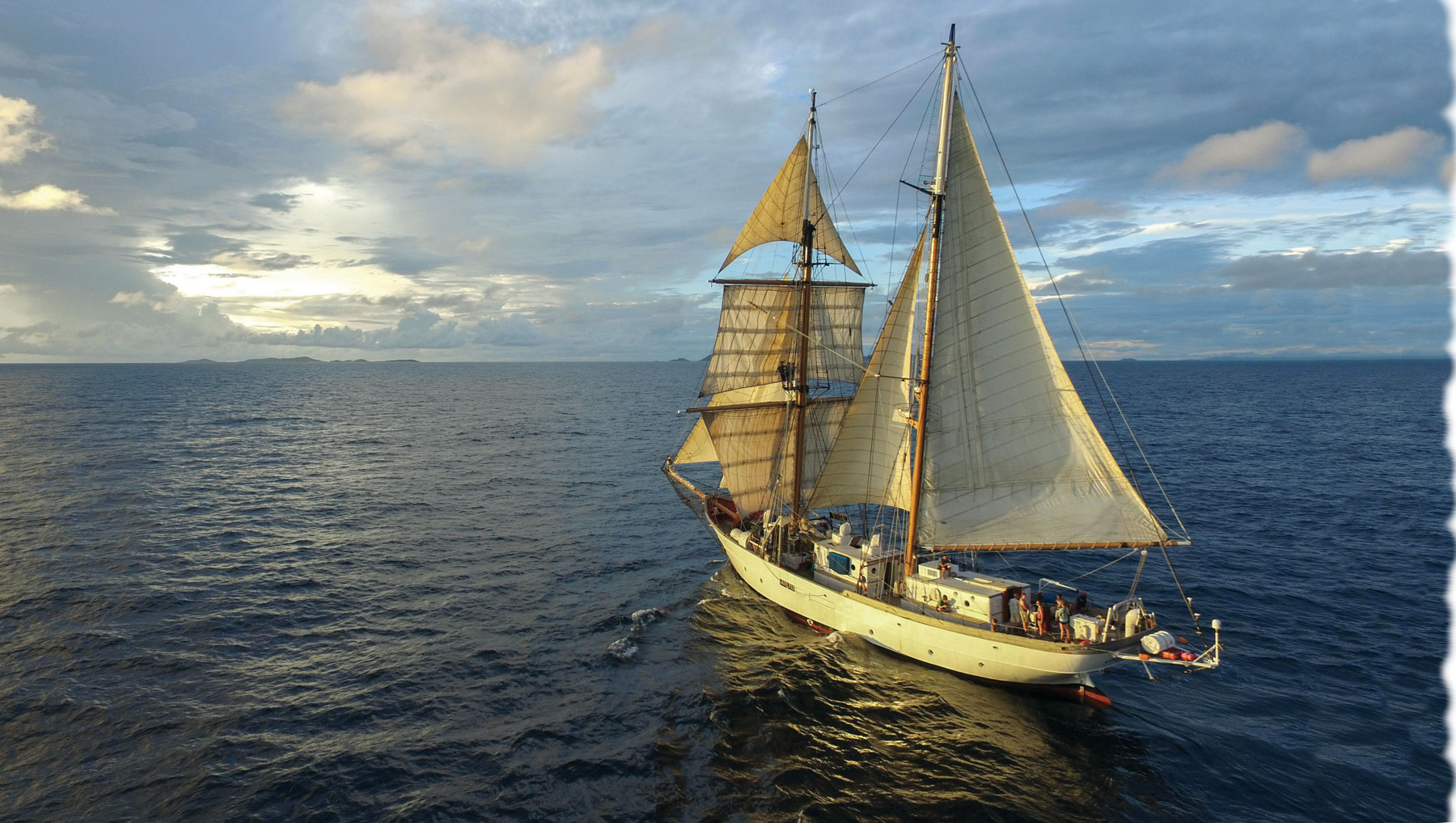
Since 1994, Proctor students have studied at sea as a part of Proctor’s Ocean Classroom program. Throughout those nearly three decades, Proctor has worked with different partners, most recently Sailing Ships Maine, to deliver this life-changing off-campus program that puts students at the center of learning aboard a tall-ship. It is with great enthusiasm that Proctor announces a new partnership with Sea Education Association (SEA) out of Woods Hole, Massachusetts for the fall Ocean Classroom program.
For the past 51 years, SEA has served as a leader in sail training programs and is considered to be the gold standard in sail and ocean education at both the high school and collegiate levels. A well-connected organization that works in proximity and collaboration with Woods Hole Oceanographic and National Oceanic and Atmospheric Association (NOAA), among other research organizations, SEA also operates the steel hulled 134 foot,158 ton brigantine schooner SSV Corwith Cramer that was built in 1987 in Bilbao, Spain. The ship is equipped with an oceanographic laboratory and powered by a 500 HP Cummins Diesel and holds an “All Oceans” designation for operating.
Proctor has worked with SEA to design a custom program that will mirror SEA’s college programs whereby Proctor students will spend an initial portion of the term at the Woods Hole campus involved in interactive, hands-on coursework where they will build the skills in preparation for research aboard the vessel and for the voyage. The ensuing voyage will see students sailing from Woods Hole to Lunenburg, Nova Scotia, where they will focus on fisheries, wildlife, and the history of whaling, before continuing on to Bermuda where they will study human impacts on climate and ocean plastics. The third leg of the voyage will see students sail from Bermuda to Charleston, focusing their studies on human movement, trafficking, and migration across oceans. The final leg of the journey will have students transit back to Woods Hole where they will finish research projects in preparation for a final symposium to be held at Proctor on November 9.
The program’s curriculum will be organized into two four-week units, the first program on shore at SEA’s campus in Woods Hole and the second on board the SSV Corwith Cramer.
The shore component introduces students to the foundations of understanding the ocean and the history of human interactions with marine spaces and resources. These topics are introduced in the classroom in various formats, including lectures, student-driven discussions based on assigned readings, field trips, field-based research, and lab sessions. Grounded with this framework for understanding major questions in oceanic studies, students will design group research topics onshore that address the questions they find most compelling. Then, by collecting samples and data aboard SEA’s oceanographic research and sailing vessel, they will gather the data they need to complete their projects upon return to campus in Woods Hole before delivering their results to the broader Proctor community in a final symposium on the Proctor campus at the end of the program.
Ocean Classroom Director Brooks Bicknell ‘77 shares, “I am incredibly excited for our new partnership with SEA and the direction Ocean Classroom will be taking moving forward. Today, more than ever, it is critical that we all gain a deeper understanding of 324 million cubic miles of seawater or 2/3 of the earth’s surface that supports and modifies the weather of our planet. SEA, with their experienced faculty and well equipped brigantine schooner SSV Corwith Cramer, will be able to best prepare and facilitate a better understanding of the ocean, its ecosystems, and the history of human interaction on and across the waters the with a voyage route that will take them from Cape Cod to Nova Scotia, Bermuda, Charleston, and back to Woods Hole.”
Proctor’s Head of School Brian Thomas adds, “On the doorstep of Proctor’s 30th Anniversary of Ocean Classroom, we are proud to be partnering with SEA starting in the fall. It will be a partnership that allows our students, and our school, to leverage their many years of educational programming at sea. At Proctor, we live our motto: Live to learn. Learn to Live. We wholeheartedly believe in forming good habits that impact the world; a student understands their place and responsibility in and to the world by what they repeatedly do. Our work linking Ocean Classroom with SEA will teach students to be even better stewards of the world they will inherit.”
SEA President John Wigglesworth reflects, “Ocean Classroom at SEA is a partnership that, in many ways, has been in the makings for decades. I am pleased that Proctor Academy and the Sea Education Association are now shipmates.” SEA Academic Dean Mark H. Long adds, “We are excited to partner with Proctor Academy’s Ocean Classroom program, combining over eighty years of ocean education experience to educate and inspire a new generation to find solutions for the problems vexing our global ocean.”
About Sea Education Association:
Sea Education Association (SEA), a non-profit 501(c)(3) corporation, is an internationally recognized leader in undergraduate ocean education. Since 1971, we have equipped over 10,000 high school and undergraduate students with the tools to become environmentally literate leaders. prepared to address the defining issue of the twenty-first century: the human impact on the environment.